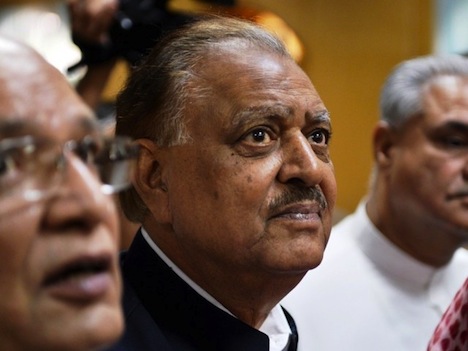Pakistan has a new president, Mamnoon Hussain, following a hasty election by the National Assembly and the four provincial assemblies.![]()
Given the strength of the hold that the Pakistan Muslim League (N) (PML-N, اکستان مسلم لیگ ن) has on Pakistan’s government following national elections earlier in May, the outcome was never really in doubt, and Hussain is a loyal supporter of newly elected prime minister Nawaz Sharif.
Hussain will succeed Asif Ali Zardari, the widower of the late prime minister Benazir Bhutto and the de facto head of Pakistan’s opposition party, the Pakistan People’s Party ( PPP, پاکستان پیپلز پارٹی), which governed the country from 2008 until the PML-N’s victory earlier this year. Zardari, whose PPP took power in part due to sympathy from Pakistani voters following Bhutto’s December 2007 assassination, has never been incredibly beloved within the country, and his government soon became unpopular.
Zardari signed off on constitutional reforms stripped the presidency of much of its power in 2010, thereby avoiding impeachment from a flurry of corruption charges, from which Zardari has since been shielded, due to presidential immunity. By the time Zardari agreed to the constitutional amendment, he faced significant political protests and multiple showdowns with the Pakistani constitutional court. So the presidency that Hussain will assume is not the same presidency Zardari held and that former military leader and general Pervez Musharraf held before him — the president, for example, no longer has the power to dissolve Pakistan’s parliament or to make key military or foreign policy decisions.
Nonetheless, in his role as a top PPP leader, Zardari remained the most important leader in Pakistani politics, far overshadowing either of the two prime ministers that served him: Yousuf Raza Gillani from 2008 to 2012 and Raja Pervaiz Ashraf from 2012 until 2013. Gillani himself was forced out of office by Pakistan’s constitutional court when it declared Gillani retroactively disqualified after yet another dispute over corruption charges against Zardari and Gillani’s refusal to cooperate with the constitutional court over the Zardari charges.
But Hussain is not Zardari — it’s Sharif, instead, that has long been the head of the PML-N (the ‘N’ in the party’s name stands for Nawaz), and his brother Shahbaz Sharif has been the chief minister of Punjab, Pakistan’s largest province, since 2007.
Hussain, age 73, is a relatively little-known party loyalist, who remained faithful to the PML-N even after Musharraf, then Sharif’s army chief of staff, pushed Sharif out of office and into exile in 1999. Hussain previously served as the governor of Sindh province (traditionally a PPP stronghold) briefly from June to October 1999, when Musharraf took power by military force.
Hussain is a mohajir, a Muslim born in what is today Uttar Pradesh, India, and has been a textile businessman in Karachi and a former president of the Karachi Chamber of Commerce and Industry. That makes Hussain somewhat of an outlier within PML-N politics — many of Karachi’s fellow mohajir support the secular Muttahida Quami Movement (MQM, متحدہ قومی موومنٹ), a Karachi-based party that represents mohajir interests and is now so strong that it holds a nearly mafia-like grip on Karachi government.
But in choosing the Karachi-based Hussain, a mohajir who lives in the PPP’s strongest province, Sharif has made a presidential choice that indicates he wants to put a more national stamp on his administration. Sharif owes his national government to his party’s overwhelming success in Punjab province, home to around 55% of the country’s population, where the PML-N won the majority of its 166 seats to Pakistan’s National Assembly.
In contrast, the PPP and the MQM won more seats in Sindh province, nationalists won more seats in restive Balochistan province, and the secular, anti-corruption Pakistan Tehreek-e-Insaf (Movement for Justice or PTI, پاکستان تحريک) of former cricket star Imran Khan won more seats in northwestern Khyber Pakhtunkhwa province, partly on the strength of his calls for peace talks with the Pakistani Taliban and for an end to American drone attacks in the region. Moreover, Pakistan’s provincial assemblies, also elected in May 2013, broke down largely the same way — Khan and the PTI now rule locally in Khyber Pakhtunkhwa, and Zardari’s PPP rules locally in Sindh province, in alliance with the MQM.
Choosing an Indian-born president might also help Sharif’s push to ease tensions with India — Sharif has already reached out to Indian prime minister Manmohan Singh, and the two may meet in New York at a meeting of the United Nations General Assembly in September.
Hosein, however, is not the first Pakistani president to have been born in what is today India. Pakistan’s first president, Iskander Mirza, was born in West Bengal (his administration was most notable for the fact that it was deposed in a 1958 coup d’état). Musharraf was actually born in Delhi, and was most notable for the fact that he was deposed in a 1958 military coup). Hussain was actually born before Partition (like Musharraf, but unlike Zardari). Musharraf was born in Delhi, and Mohammad Zia-ul-Haq, Pakistan’s previous military leader from 1978 to 1988, was actually born in Jalandhar, which lies in what is today the Indian state of Punjab.
Sharif faces an even more delicate task in choosing a successor to Ashfaq Pervez Kayani, who since 2007 has served as army chief of staff, the leader of Pakistan’s military. Kayani, unlike Musharraf before him, has worked to keep largely outside of domestic politics, though Pakistan’s military and intelligence services wield significant power.
Though the PPP boycotted the vote (originally scheduled for August, and then moved up to July 30, the PPP leaders protested that there wasn’t enough time for an adequate campaign), it was regardless very unlikely that the new president would not be a Sharif ally.

One thought on “Pakistan’s new president: Who is Mamnoon Hussain?”